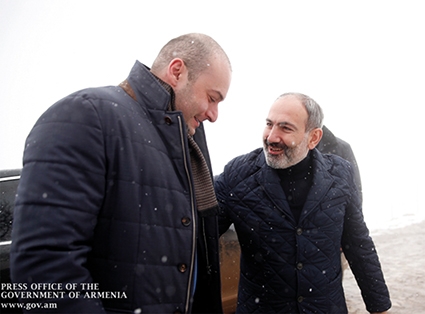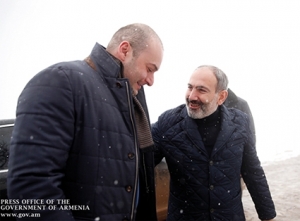Busy Bees
Last week, Prime Minister Mamuka Bakhtadze travelled to Armenia for a meeting with his counterpart, Nikol Pashinyan. The PM of Armenia hosted him in Enokovan village. Like their meeting two months ago in Bolnisi, this one was also of an informal character. In both cases, the parties did not disclos the reason or the themes of their meeting. The officials were short in their descriptions but stressed how beneficial the said format is. The press-speaker of the Armenian PM noted that he was saddened by the bad weather. At a glance, there is nothing strange about informal meetings, but if we take a closer look, we may find there is more to it.
By examining the political calendar of Geo-Armenian relations, we can see that in the last month alone, Official Tbilisi has been strikingly active. It is hard to tell why, but fact is fact. On January 15, a day after the election of Pashinyan, he travelled to Bolnisi to meet Bakhtadze. On February 22, Minister of Defense Levan Izoria met with the Armenian PM in Yerevan. On March 12, it was President Salome Zurabishvili who met him. And now, it is Bakhtadze again. Four high-level meetings within three months, the last three of which within a month. Impressive statistics, especially if we consider the low-intensity of such meetings in recent years. Something is definitely going on between the two countries. Guessing whose and what messages the officials are carrying back and forth is truly food for thought.
The importance of dialogue between Tbilisi and Yerevan could be overestimated, but as we look at the intensity of meetings with Baku, an array of grounded suspicions arise. Especially after Geneva, where for the first time the delegations of Russia and Georgia faced each other within a new format. The parties met to discuss the issues of cargo transition on the occupied territories, and, as we are all aware, Armenia is directly affected, hence highly interested, in using said trading corridors. The importance of these for Georgia is another issue. Opening an alternative road leading towards Russia was discussed even in PM Kvirikashvili’s time, however, he and then-PM Sargsyan never met this frequently, which makes us think that Pashinyan has more “headaches” than just the corridor.
Apart from opening new transport corridors, Pashinyan could be worrying about the recent regulations that were enforced. Unlike Azerbaijan, Armenia is a member of the Eurasian Economic Union. From 2019, the regulation states that non-member countries will be affected by higher taxes on the import of vehicles. Of course, this affects Georgia, which exports vehicles to Armenia. President Putin must have been hoping for a monopoly for the Russian brand Lada. Clearly, Pashinyan could be under threat, as the Armenian population fancies Mercedes and Toyotas more, forcing him to find a way out of the situation through Georgia.
The Armenian dream of being economically connected with Europe, without sacrificing security guarantees from Russia, was buried by Putin when the latter “dragged” Armenia into the Eurasian Union. At the time, one of the main conditions of Armenia’s becoming a member was the Kremlin’s promise there would be new transport corridors. It seems now is the time for the promises to be fulfilled.
Notably, the President of Armenia tried to play his cards a few years ago when he suggested Georgia sell Georgian products through Armenian companies which had special tax deductions on operating in the Union member states. To put it simply, this meant “don’t tax the cars and I won’t tax the wine that will be sold on the Eurasian markets.” Seems this offer is still legit, which may be why PM Pashinyan is contacting Official Tbilisi so often.
By Zaza Jgarkava












